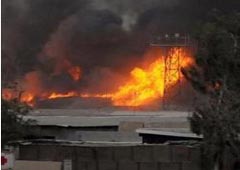Reportedly, the military wing of Hezbollah in Iraq, a militant organization active during the American military  presence, has claimed responsibility for the mortar attacks on Camp Liberty that left a count casualty of nearly 60 on both sides, the Iraqi guards and the residing MKO members. In a statement, as it was expected, MKO accused the Iranian and Iraqi regimes to be not only the responsible but behind the attacks. But the chief responsible for the attacks and the inflicted casualties is MKO itself with Massoud Rajavi at the head.
presence, has claimed responsibility for the mortar attacks on Camp Liberty that left a count casualty of nearly 60 on both sides, the Iraqi guards and the residing MKO members. In a statement, as it was expected, MKO accused the Iranian and Iraqi regimes to be not only the responsible but behind the attacks. But the chief responsible for the attacks and the inflicted casualties is MKO itself with Massoud Rajavi at the head.
Regardless of all these accusations and who the real directors of the attacks might be, MKO is the side that best benefits from the bloodshed. In fact, the leaders are not at all looking for the responsible to accuse; whoever they are, they have served MKO in the best way to deserve its thanks. It makes no difference for Rajavi who is sacrificed from which side; the emphasis is on the applied brutality to claim victims. And for MKO, the more victims the better.
The suffering, enslaved insiders of MKO have always been the front-line victims and their families, pressing effortlessly to rescue them, have repeatedly declared that Iraq is not a safe place for their children and relatives to stay. From the within the insiders are, physically and psychologically, under relentless pressure of a totalitarian cult, and from without, there are an ever-increasing likelihood of violent reaction from Iraqi people looking for any opportunity to strike at MKO in revenge for its flagrant collaboration with Saddam against the Iraqi people.
The Committee for the Defense of Iraqi victims of the terrorist MKO has reportedly filed more than 280 complaints against the group in German, Spanish and Turkish courts of law. The chairman of the committee Nafee Issa has asserted that lawyers have filed complaints on behalf of Iraqi victims particularly by farmers living in Diyala province whose crop lands have been occupied by the group to be walled and to establish the cult bastion called Ashraf. In fact, it was a legal demand by the Iraqi government and the local people, to whom the lands belong, to close the camp and return the lands to their real owners. Naturally, MKO as the occupier was reluctant to return what it had seized mostly because its erected utopia was known to be both its ideological and military bastion.
The group, however, was forced to leave Camp Ashraf and the residents were transferred to Camp Liberty near Baghdad. The group is well aware of the fact that relocation from Ashraf is equal to permanent expulsion from Iraq sooner or later. From the very day the first group of members arrived at Liberty, the leaders began a widespread campaign to stop the process of relocation. Now they are nagging, urging and plotting to be returned to Ashraf. And the recent mortar attack has provided the golden opportunity the leaders were looking for. In a statement after the incident, MKO accused the Iranian government and Iraqi forces of being behind the attack, and blasted the Iraqi government for its recent decision of removing the blast walls surrounding the Camp Liberty and, of course, repeated the necessity of being returned to Ashraf:
“The residents and their representatives have warned about a massacre by the Iranian regime and the Iraqi forces, and demanded several times from the secretary general of the United Nations and U.S. officials to return to Camp Ashraf, where concrete buildings and shelters are available.”
What is done cannot be undone but any similar operation for any claimed legal and just reason is either in the behest of MKO or an act on behalf of MKO. The safety of the residents, despite being known as the members of a despised terrorist cult, has to be guaranteed until they are resettled to third countries.
The Attacks that Promote MKO Cause
62
Any attack against MKO is either in the behest of MKO or an act on behalf of MKO
previous post

